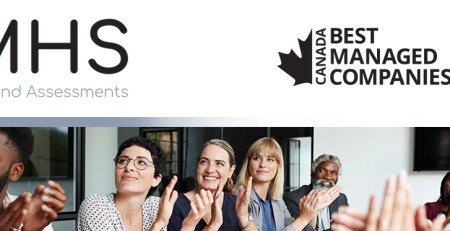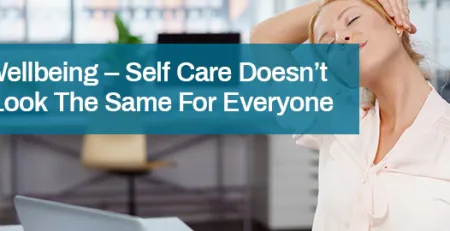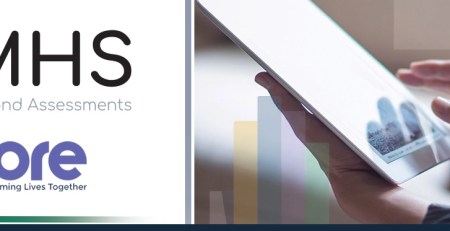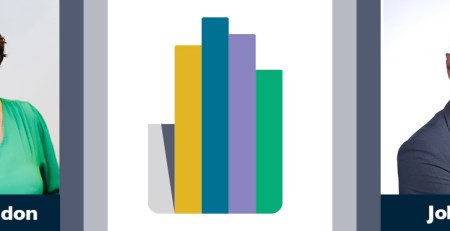40 Years of Innovation: Celebrating MHS
“One of our driving forces was to really change psychology, and to have an influence across the field in terms of what we were doing […] We could just see beyond us that there was an opportunity to make a bigger change than we could make by ourselves.”
– Dr. Steven Stein, Founder and Executive Chair, MHS
MHS’ story begins in 1983, when Dr. Steven Stein, a clinical psychologist at a children’s mental health center, became curious about a revolutionary idea. Through a research study, Steven noticed more and more that children were not completing or putting forth their best effort during psychological assessment. Steven saw potential in bridging this gap by leveraging a tool many of us use today: a computer. Using computers, children could respond to psychological questionnaires digitally, and the idea caught on quickly. Steven remembers, “Lo and behold, the kids loved it! They would come to my office and ask if I had more questionnaires to fill in. It was so much fun!”
Despite the increased engagement from children, there were barriers to implementing this new and innovative approach. Although children were more comfortable disclosing details about how they were feeling and what they were experiencing, psychologists were not comfortable with placing their clients in front of a screen. As a result, Steven had to display his work in front of a research ethics committee before he could put children in front of a computer again. Since then, the use of technology in psychological testing has been adopted across the globe.
MHS 1.0: A vision, Steven and Rodeen
Steven decided to pursue digitizing psychological assessments on his own by working nights. With the help of his wife and lifelong business partner, Rodeen Stein, Co-Founder of MHS, they started their business from the ground up. In their basement, the founders of MHS established an office and hired their first assistant. They formed a unique partnership, as Rodeen was always interested in pursuing a career in psychology, and Steven had a vision to bring digital psychological testing to new heights. As far as the story goes, this chapter of MHS’ journey was called MHS 1.0. Steven’s vision was to find the opportunity to make a bigger change than he and Rodeen could achieve on their own. The first step to reaching this goal was retaining commitment from the community of psychologists.
Steven and Rodeen put in a lot of hard work to build up customer lists, create an annual catalog, and host booths at local conferences. During the first era of MHS’ digital journey, assessments were developed using a now-outdated technology known as a floppy disk. Unfortunately, the psychology community was not yet prepared for the leap in technology that MHS represented. As a result, the business was forced to abandon its digital efforts and switch to paper-based products to survive. Despite this setback, Steven and Rodeen were able to pivot their business strategy and keep their company afloat.
MHS 2.0: Passion and growth, Gerry FitzGerald
“We were the first ones in our sector to commit to our digital dream, the only one to build an organization that values contributions from across the organization and actively encourages staff engagement in our business, our performance, and our plans. We have helped change our industry.”
– Gerry FitzGerald, Chair, MHS Advisory Council
In September 1989, a new member joined Steven and Rodeen in their small apartment office. At this point, MHS had slightly expanded, and Gerry FitzGerald joined as the company’s General Manager and later President. Gerry came from a background in book publishing. During the initial years of MHS, Steven and Gerry continually discussed the vision and direction Steven envisioned for the company. Steven’s vision was unwavering, “I want this to be a completely digital, psychological assessment publisher.”
The 90s were a significant time for growth at MHS, with a major expansion in staff and two office relocations. The final move was to MHS’ present main campus location in Toronto. Gerry recalls this as a symbolic move, from a start-up to a firm with its own building; and by 1999, with a total of 80 staff members, MHS’ trajectory was quite impressive.
In 1990, the commercial publication of the Conners Rating Scale, MHS’ first paper assessment, became a groundbreaking step, as the Conners rapidly set the standards for ADHD testing worldwide. Gerry played a vital role in conceptualizing MHS’ first digital assessment platforms. In 1994, he registered MHS’ domain as MHS.com. MHS was the first test publisher to register a domain! Our first attempt at creating an integrated digital application, “SHRINK,” was underway when technological infrastructure (like the cloud) was still rudimentary. SHRINK was a great example of a product ahead of its time, but it was an important learning opportunity for MHS.
Although MHS specialized in publishing paper assessments, we prepared to deploy future digital versions of those same assessments, looking ahead to the eventual dominance of a digital marketplace. MHS became a leader in the testing industry by releasing the Conners Rating Scale – Revised™ (CRS-R). The Conners 3rd Edition™ (Conners 3®) followed the CRS-R and brought significant changes to MHS’ product development processes. MHS expanded into the clinical and education space by developing advanced ADHD testing with the CPT and entered the talent and public safety industries with renowned emotional intelligence and risk/needs assessments. These expanded markets allowed MHS to pave new paths.
Once MHS began rapidly digitizing the paper experience, replicating the way a sheet of paper is filled out, it entered its new chapter, MHS 2.0. In Gerry’s words, “Paths to organizational destinations are seldom straight; they wander and shift with changes in the environment and move as new opportunities develop. The important thing is not to lose sight of the vision. While we have had our share of course corrections, we never lost sight of where we were heading, to become a completely digital assessment developer/publisher.”
MHS 3.0: A glimpse into the future, Hazel Wheldon
“Giving back, making a difference, building products that change lives, is fundamental to who we are, and it’s the true source of the passion within this organization.”
– Hazel Wheldon, Chief Executive Officer, MHS
In 2003, MHS gained a new senior member on the team, Hazel Wheldon. Marking her 20th anniversary working with MHS this year, Hazel initially joined MHS as Vice President of Research and Development. Throughout her career, Hazel had worked in research and publishing and later took on the role of President at MHS. There was something about MHS’ passion for greatness that drew her in. However, there was work to be done to move the company forward. So, Hazel began her new journey as CEO at MHS while maintaining and fostering the collaboration that MHS’ reputation was built on. Collaboration remains an integral part in improving our products and technology and creating the best possible solutions for several communities.
Hazel says, “You can have the best assessment grounded in the best science, but if it’s not easily accessible or usable for our customers, it doesn’t make any sense […] Alternatively, you can have the best user experience, but if the product does not stand up to the science rigors, then customers aren’t going to use it.”
MHS’ solutions are supported by a framework of fairness and trust established with our communities. In particular, our focus on digital trust, equity, fairness, and bias-reduction. MHS is trusted with our customers’ most crucial assets: their health and personal data. Maintaining trust in a digital era is where we have most invested our time and energy to maintain maximum security and compliance.
Over the years, MHS has also continued giving back to the community and keeping corporate responsibility top of mind in the development of our Community 360 initiative, partnered with the BGC Toronto Kiwanis. Our goal of giving back to the BGC community has evolved to offering endless volunteer opportunities for our staff members, providing scholarships and bursaries to college and university students, hiring summer interns, sending kids to summer camps, and granting holiday wishes for BGC families.
Hazel looks to MHS 3.0, which involves transforming the entire testing process. Hazel says, “As a global leader, we remain steadfast in our commitment to scientifically validated assessments while pioneering first-generation digital solutions. Our unwavering differentiators, nurtured since the early years, will continue to guide us into the future.”
From all of us at MHS, we extend heartfelt gratitude to our customers, catalysts of our evolution over the past four decades. Fueled by our passion for innovation, we vow to serve and surpass expectations for years to come. Together, we forge an extraordinary path towards endless possibilities.










